Tech Diplomacy Now: War and Solar Storms are Disrupting Satellite Navigation
These outages are due to military jamming and unusually high solar radiation that is causing satellites to malfunction.
TABLE OF CONTENTS
Top News of the Week
Announcements
Latest News
Technology Strategy and Policy
Artificial Intelligence
Telecommunications Networks and Infrastructure
Critical Minerals
Synthetic Biology
Quantum
Advanced Aerospace Technology
Semiconductors and Microelectronics
Energy and Climate
Opinion and Commentary
Top News of the Week – War and Solar Storms are Disrupting Satellite Navigation
Sophisticated military operations and unusually large solar storms are wreaking havoc on satellite navigation systems like GPS. Outages spread across the Black Sea, the Eastern Mediterranean and along contested borders. These outages take place due to military jamming, but also unusually high solar radiation that is causing satellites to malfunction.
Key Takeaways:
The most pervasive satellite navigation jamming is taking place along the Russian-Ukrainian front and into the Black Sea, as well as in the Eastern Mediterranean as Israel seeks to complicate being targeted by Iran and its proxies in Gaza and Lebanon.
GPS Satellite jamming is also taking place along the PRC borders with Myanmar and India, as well as between India and Pakistan.
The jamming and spoofing of satellite navigation signals creates malfunctions for aircraft and other systems that rely on GPS for navigation.
More Background:
How GPS warfare is playing havoc with civilian life – FT, May 12, 2024
Solar Storm Knocks Out Farmers' Tractor GPS Systems During Peak Planting Season – 404, May 12, 2024
Germany says Russia very likely responsible for Baltic GPS disruptions – Reuters, May 5, 2024
Russia blamed for GPS interference affecting flights in Europe – BBC, May 2, 2024
The Dangerous Rise of GPS Attacks – Wired, April 30, 2024
Announcements
Krach Institute CEO, Michelle Giuda addresses Council of the Americas 54th Washington D.C. Conference
Last week, Michelle Giuda, CEO of the Krach Institute for Tech Diplomacy at Purdue, participated in the Council of the Americas “Digitizing the Americas” panel. The panel was moderated by Bloomberg Business reporter Jackie Davalos and featured Marushka Chocobar, Special Advisor on Digital Transformation for the Government of Peru, Dominic Delmolino, Vice President of Technology at Amazon Web Services, and Carlos Felipe Jaramillo, Vice President for Latin America and Caribbean for the The World Bank.
The panel, which centered on the significant opportunities new technologies offer to the region, emphasized the critical need for the widespread adoption of trusted technology and highlighted the importance of infrastructure, workforce development, and policy.
According to Michelle Giuda, the key to advancing the business case in Latin America isn't just technology—it's trusted technology, built upon trust principles which will deepen diplomatic, economic, and technological partnerships.
Trusted technology brings a new era of global collaboration where cutting-edge tech is developed and exchanged based on democratic trust principles like respect for the rule of law, property, the press, human rights, the environment, national sovereignty, and practices rooted in transparency, integrity, and reciprocity.
These trust principles are crucial in shaping the emergence of AI regulations, legislation, and semiconductor innovation, driving investment and partnerships throughout the region. The opportunity for Latin America and the entire region is exciting.
"Latin America is a region that promises to be in most of the advanced region in digital transformation for the next years," said Marushka Chocobar of Peru.

And what does Latin America need to capitalize on the potential of new technologies? Dominic Delmolino of AWS spotlighted three key areas: infrastructure, digital capability, and a skilling of the population. On that last theme, Chocobar spotlighted Peru's effort to train and retain tech talent.
You can watch the full panel discussion below:
Latest News
Statement on the President’s Decision Prohibiting the Acquisition by MineOne Cloud Computing Investment I L.P. of Real Estate, and the Operation of a Cryptocurrency Mining Facility, in Close Proximity to Francis E. Warren Air Force Base – U.S. Treasury Department, May 13, 2024
Japan defense chief urges higher security after drone video of warship posted on China social media – Associated Press, May 10, 2024
Huawei Secretly Backs US Research, Awarding Millions in Prizes – Bloomberg, May 2, 2024
TSMC aims to produce ultra-advanced 1.6-nm chips by 2026 – Nikkei Asia, April 25, 2024
Europe needs to be stronger, not a U.S. ‘vassal,’ says France’s Macron – WaPo, April 25, 2024
Technology Strategy and Policy
Japan’s Kishida unveils a framework for global regulation of generative AI – Associated Press, May 2, 2024
Most Americans see TikTok as a Chinese influence tool, Reuters/Ipsos poll finds – Reuters, May 1, 2024
Readout of Disruptive Technology Protection Network Summit with Japan and the Republic of Korea – U.S. Department of Justice, April 26, 2024
The U.S. Munitions Deficit Is a Political Problem – Foreign Policy, April 26, 2024
Artificial Intelligence
OpenAI debuts GPT-4o ‘omni’ model now powering ChatGPT – TechCrunch, May 13, 2024
US aims to stay ahead of China in using AI to fly fighter jets, navigate without GPS and more – Associated Press, May 12, 2024
Chinese unicorn Zhipu AI to launch Sora rival as early as 2024 amid local race to catch up with OpenAI: report– SCMP, May 8, 2024
Saudi Arabia’s $100 Billion AI Fund Will Divest China If US Asks – Bloomberg, May 7, 2024
Defense think tank MITRE to build AI supercomputer with Nvidia – WaPo, May 7, 2024
Meet MAI-1: Microsoft Readies New AI Model to Compete with Google, OpenAI – The Information, May 6, 2024
China tops the U.S. on AI research in over half of the hottest fields: report – Axios, May 3, 2024
Telecommunications Networks and Infrastructure
US revokes licences for supply of chips to China’s Huawei – FT, May 7, 2024
Europe is nowhere close to banning TikTok – Politico, May 7, 2024
Taiwan must harden undersea cables, NSB says – Taipei Times, May 2, 2024
Biden’s internet-for-all program needs Musk’s help – WaPo, May 1, 2024
TikTok ban in EU is ‘not excluded,’ von der Leyen says – Politico, April 29, 2024
Critical Minerals
America’s War Machine Runs on Rare-Earth Magnets. China Owns That Market. – WSJ, May 4, 2024
US, Philippines Eye Agreement to Cut China Nickel Dominance – Bloomberg, May 1, 2024
Graphite miners lobby US govt to impose levy on China-sourced EV material – Reuters, April 30, 2024
Synthetic Biology
China, Biotechnology, and BGI: How China's Hybrid Economy Skews Competition – CSET, May 10, 2024
Biotech Matters: Problems with Life Science Databases in the United States – CNAS, May 1, 2024
Biotech Matters: Public-Private Coordination of Biotechnology – CNAS, April 22, 2024
Quantum
China creates its largest ever quantum computing chip — and it could be key to building the nation's own 'quantum cloud' – LiveScience, May 13, 2024
Gen AI Has Already Taken the World by Storm. Just Wait Until It Gets a Quantum Boost – Time, May 13, 2024
Quantum computing takes a giant leap forward with breakthrough discovery – Earth.com, May 12, 2024
'World's purest silicon' could lead to 1st million-qubit quantum computing chips – Space, May 10, 2024
Advanced Aerospace Technology
A Domain of Great Powers: The Strategic Role of Space in Achieving China’s Dream of National Rejuvenation– NBR, May 10, 2024
Comac’s Homegrown Aircraft Goes Global – Jamestown Foundation China Brief, May 10, 2024
Brussels slams Berlin’s ‘ill-founded’ effort to delay EU satellite project – Politico, May 1, 2024
Semiconductors and Microelectronics
Global Chips Battle Intensifies With $81 Billion Subsidy Surge – Bloomberg, May 12, 2024
China’s biggest chipmaker SMIC warns of ‘fierce’ competition as it misses quarterly profit expectations – CNBC, May 10, 2024
America Projected to Triple Semiconductor Manufacturing Capacity by 2032, the Largest Rate of Growth in the World – SIA, May 8, 2024
Biden administration plans $285M in CHIPS Act funding for digital twins – TechCrunch, May 6, 2024
Energy and Climate
Small, well-built Chinese EV called the Seagull poses a big threat to the US auto industry – Associated Press, May 13, 2024
5 takeaways from Biden's tariff hikes on Chinese electric vehicles - NPR
Chinese EVs are cheap. For America, that could be a problem – NPR, May 6, 2024
Opinion and Commentary
A Plan to Revitalize the Arsenal of Democracy – Michael Brown, May 10, 2024
How the US can set standards on international deep-sea mineral mining – James Borton and David Hessen, SCMP, May 1, 2024
TTC and a New Thought – William Alan Reinsch, CSIS, April 15, 2024
About: Tech Diplomacy Now
The Krach Institute for Tech Diplomacy at Purdue is the world’s preeminent trusted technology accelerator. As the leader of the new category of Tech Diplomacy, the Institute integrates technology expertise, Silicon Valley strategies, and foreign policy tools to build the Global Trusted Tech Network of governments, companies, organizations and individuals to accelerate the innovation and adoption of trusted technology and ensure technology advances freedom.





